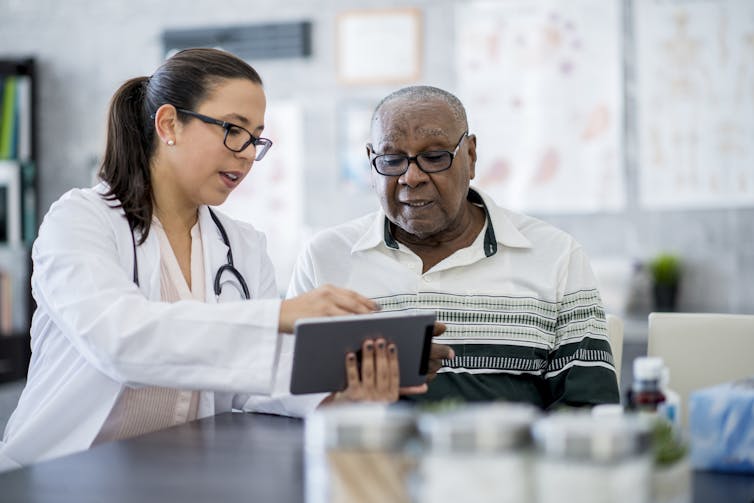By Julia Liu, Morehouse School of Medicine and RaKetra Snipes, Morehouse School of Medicine
Clinical trial participants are predominantly white. Despite Black and Hispanic people respectively making up 12% and 16% of the U.S. population in 2011, together they made up only 6% of clinical trial participants overall that year.
Clinical trials that are representative of all patients are essential to ensure that treatments are effective for everyone. Drugs work differently for each person based on different factors. Including diverse patient populations in clinical trials makes sure these factors are accounted for. But the perception that recruiting white patients is easier, less time-consuming and more cost-efficient than recruiting underrepresented or underserved patients contributes to health disparities seen today.
We are gastroenterology researchers at Morehouse School of Medicine who run clinical trials and study ways to improve participant diversity. Identifying and addressing the barriers to enrolling in research that patients face can not only increase participation, but can also lead to better patient care.
The problem of access
Barriers to clinical trial participation start with a lack of access to trials.
Clinical trials have specific eligibility criteria, and may require a number of study-related visits to the hospital where they’re conducted. But underserved and underrepresented populations often aren’t seen in practices that recruit patients for clinical trials.
Typically, clinical trials are designed by research-focused physicians working in urban medical centers. The majority of Black and Hispanic patients have limited access to the health care system as a whole, and the centers that serve them often do not have the research infrastructure or resources to run clinical trials.
While researchers have made attempts to increase the diversity of clinical trial participants, misconceptions and biases within the medical community about underrepresented populations limit these outreach efforts. For example, beliefs persist that Black patients aren’t willing to participate in research studies and are noncompliant and mistrustful due to historical abuse from medical researchers, such as in the Tuskegee syphilis study.
https://www.youtube.com/embed/7qAld9bGwlA?feature=oembed&enablejsapi=1&origin=https://newpittsburghcourier.comLimited access to clinical trials is both a product of and driving factor behind health disparities.
A colon cancer case study
One example of how lack of diversity in clinical trial participation can lead to poor health for patients is outcomes for inflammatory bowel disease. IBD is a chronic condition that comes in two forms, ulcerative colitis and Crohn’s disease. Patients with IBD have an increased risk of developing colorectal cancer.
Black patients account for 75% of IBD cases at Morehouse School of Medicine. Many of our current patients were either previously misdiagnosed or only treated for their symptoms in the emergency room without further investigation. This has led to many of our patients getting diagnosed with IBD when the disease is already at an advanced stage, making it more difficult to treat.
Julia Liu started Morehouse’s first colorectal cancer clinical trial in 2021. The Prevention of Colorectal Cancer Through Multiomics Blood Testing study evaluated whether a particular blood test could aid in early colorectal cancer screening. Due to misconceptions about Black patients’ interest in research, we anticipated few patients would participate in the trial because our patient base is 90% African American. The sponsor for the study expected an enrollment rate as low as one to three patients per week at our site.
However, when enrollment began, we saw high interest among our Black patients. After three months, we had enrolled 100 patients, 85% of whom were Black.
So how did we do it?
Identifying barriers
First, we identified the participation barriers our Black and Hispanic patients faced.
We conducted a pilot study to identify more broadly the main barriers to research participation in underserved and underrepresented populations in our area. We reviewed enrollment rates, failures to meet eligibility and data issues, among others, from our past studies to see where we could improve.
We evaluated the role of mistrust by surveying patients at an IBD education conference. Although patients often cited mistrust of health care providers and systems as a major barrier to trial participation, 70% of patients with a college education trusted their gastroenterologists, and 100% of patients with less than a college education trusted their doctors. Moreover, while 83% of respondents knew about the Tuskegee syphilis study, only 23% indicated that their decision to not participate in research was influenced by that study.

FatCamera/E+ via Getty Images
We also identified other barriers based on our experience working with Black patients in other clinical trials. A significant one was low levels of health literacy, or the ability to understand and make informed health care decisions. Another was limited access to specialty care, particularly when patients have been waiting for months for an appointment. Lack of transportation was another.
Time was another barrier. Because many of our patients have limited exposure to clinical studies, they have many questions and concerns that most clinicians do not have the time to answer in the space of a standard appointment. Patients also could not afford the time commitment required for complex clinical trials. An informed consent process can take over an hour, and many trials require frequent and prolonged hospital visits, for which patients may not be able to take paid time off.
Implementing solutions
After identifying these barriers, we worked to create solutions to help our patients participate in research.
We pre-screened potential study participants by looking through their electronic medical records and provider referrals. This helped us identify qualifying patients and proactively reach out to them.

valentinrussanov/E+ via Getty Images
We also trained research staff as well as hospital administration, faculty, staff and students on the study, offering tips on how to interact with underserved and underrepresented patients.
Most importantly, we encouraged our clinicians and researchers to create a safe space for participants to be able to ask questions. This also provides an opportunity to work out ways to accommodate a patient’s schedule.
Making an effort
Working with diverse participants can be challenging, but so is every other aspect of clinical research. Our results showed that intentional recruitment, flexibility and creative solutions can help increase enrollment of underrepresented populations in clinical trials.
Partnering with an institution dedicated to serving underserved populations can also help. But above all, research participants are looking for a genuine interest in their well-being.
Julia Liu, Professor of Medicine, Morehouse School of Medicine and RaKetra Snipes, Physician Assistant in Gastroenterology, Morehouse School of Medicine
This article is republished from The Conversation under a Creative Commons license. Read the original article.


